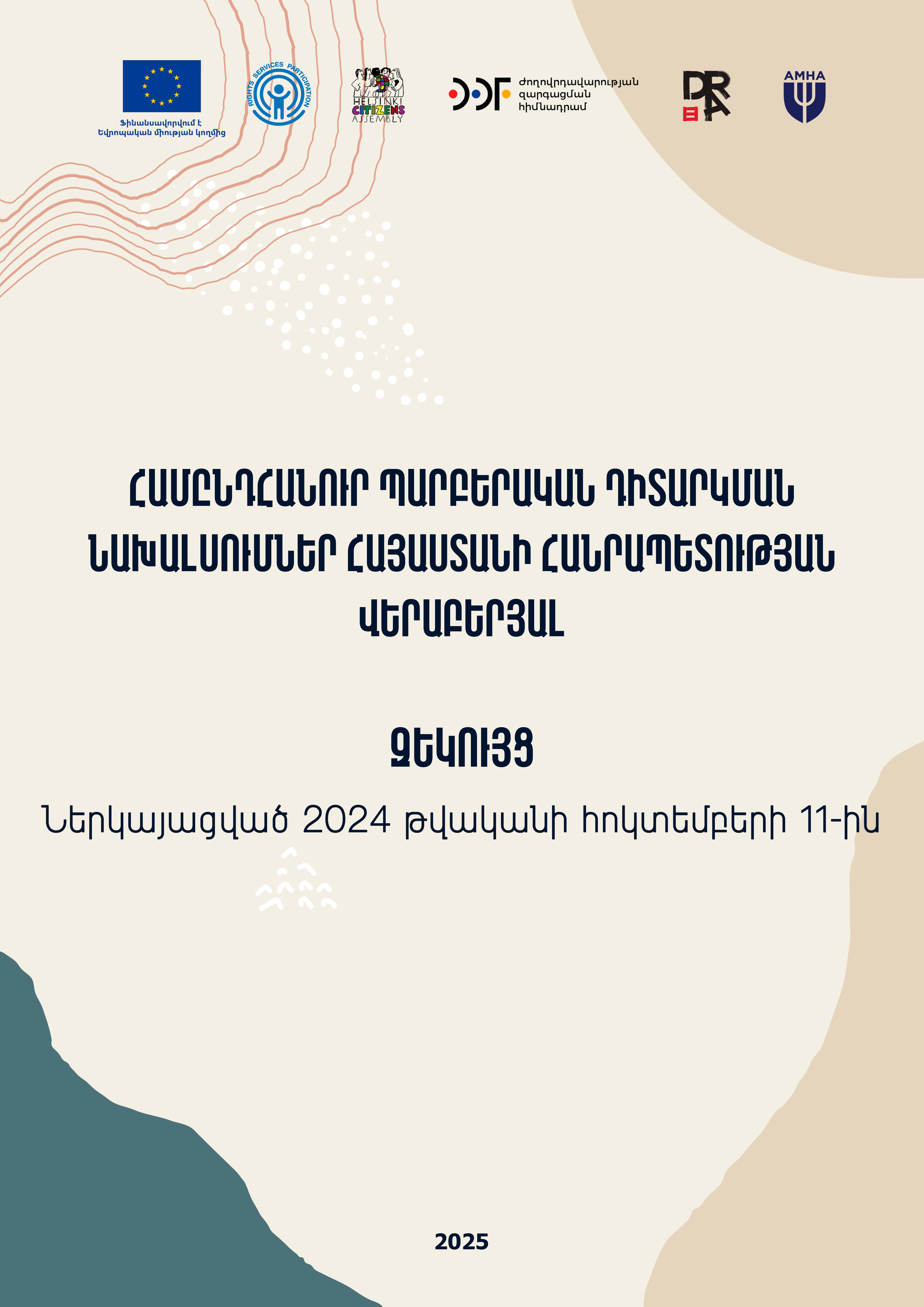




LABOR RIGHTS PROTECTION IMPROVEMENT POLICY PAPER. Recommendations of civil society organizations

Reports|Information Papers|Brochures
Labor rights violations have a continuous systemic nature in Armenia, irrespective of the employment sphere. Reports of the RA Human Rights Defender, as well as international and local organizations address, in particular, issues of proper remuneration, the right to form trade unions, elimination of discrimination.
Protection of labor rights significantly impacts fundamental human rights, since, as practice shows, victims usually refuse to protect their fundamental rights due to the real risk of being dismissed. Thus, while human rights organizations strive to raise awareness about all the aspects of labor rights, the legal support requested by citizens concerns, except for very few cases, unfair dismissal or non-provision of the final settlement prescribed by law. To understand this situation, we need to consider it in the context of the unemployment level and labor underutilization. Serious violations of labor rights also concern enjoyment of other rights, in particular, participation in electoral processes or other political rights.
The main obstacles to labor rights protection are as follows:
• Unregistered employment, i.e., absence of employment contracts, signing a different contract in the conditions of factual labor relations or non-compliance of the contract with the job description and remuneration, which, in its turn, results in
○ Lack of legal grounds and mechanisms for restoration of rights in case of being arbitrarily dismissed,
○ Non-counting of work experience and income in the pension fund and non-operation of social guarantees,
○ Arbitrary provision of vacation and other benefits, etc.
• Flawed state policy of labor rights protection and institutional toolkit, as a result of which the state does not conduct proper oversight of employers except judicial acts in the frame of separate cases, or liability measures applied by SRC or HLIB,
• Lack of trade unions in numerous spheres and ineffectiveness or inaction of existing trade unions,
• Difficulty in the process of restoring violated labor rights in court, and shortage of and ineffective non-judicial mechanisms, as a result of which the volume of infringement of rights is mostly covert.
Protection of Rights without Borders NGO conducted a study of around 500 judicial cases that were lodged with courts in 2019-2021 with respect to labor rights disputes. 2 The Court upheld 72% of applications of the observed cases. The highest rate (95%) of granting applications was recorded in the cases concerning recognition of facts of legal significance (work experience). The lowest rate was recorded in cases concerning dismissals on disciplinary grounds in administrative cases. The following are some of the recorded problems: lack or incomplete indication of legal and/or factual basis in dismissal orders; the formal nature of redundancies when dismissing people on the basis of redundancies; not providing a notice in the event of redundancy or essential changes in employment conditions; not proposing a different job; not informing about the impossibility to propose a different job; not providing the contract or the dismissal order; not observing the terms during which the employee can withdraw a dismissal notice; dismissal on the basis of expiry of the contract signed for a definite period of time in the event that the contract should be considered as signed for an indefinite period; termination of the contract based on reaching the pension age in the event that no such ground is prescribed in the employment contract; dismissal on the ground of non-compliance with the job without conducting the relevant assessment; making public servants redundant without conducting the relevant attestation; not ensuring the right to appointment preference in case of redundancy; dismissal from discretionary or administrative positions without observing the terms set by law or without specifying the basis; applying norms deteriorating an employee’s situation; transferring an employee to a lower position without the employee’s consent; not reinstating an employee in the position in the condition of a relevant judgment that entered into force, etc.
After the revolution, a number of documents were developed, including the MLSA Strategy of Employment, RA Government’s Program, draft concept of “RA Labor Code reforms” and “Work, Armenia” Strategy. These documents assumed improvement of state regulation and oversight of labor relations, increasing the role of trade unions, raising public awareness about labor relations, contributing to the establishment of corporate social responsibility, which, in its turn, would lead to the enjoyment of citizens' right to decent work. However, the Covid-19 pandemic and the second Artsakh war seem to have changed the priorities, and adoption and implementation of those documents were pushed to the background.
At the same time, according to the RA Prime Minister’s decision 3 of 3 July 2021, since 1 July 2021, in line with provisions ensuring obseravence of labor legislation requirements and other normative legal acts comprising labor rights norms, new powers were enshrined for the Health and Labor Inspection Body. While the organization is meant to conduct state oversight of implementation of labor legislation requirements, it should be mentioned that the HLIB has problems related to equipment with the legislative framework and oversight toolkit ensuring their operation in the labor legislation sphere, as well as filling their vacancies and developing their personnel’s capacity.
Results of quantitative surveys conducted among employers and employees by the APR Group NGO during May-June 2021 and September 2022 can serve as baseline data in the oversight of labor rights sphere. 4 In particular, 16.7% of the respondent workers do not have an employment contract, 13.9% were employed only on the basis of an employment order. To the question “what percent of employees work based on employment contract”, about 80% of
respondent employers responded “all employees”, 7% of employers mentioned “more than half of employees”, 5% of employers mentioned “less than half of the staff”, and 8% of employers mentioned “no-one works based on an employment contract”. According to the surveys conducted among employees, only 28,4% of 7,2 % respondents doing overtime work receive overtime payment. 3.5% of respondent employers mentioned that employees do overtime work every day, 10.6% mentioned 1-2 days a week, 12.7% mentioned 2-3 times a month. Only half of the said 27% of employers mentioned that employees received overtime payment․ For most of 26,8% who “sometimes” work on holidays and 27.5% who “almost always” work on holidays, holidays were considered regular days and they were not provided with overtime pay. A high level of exposure to harmful factors in the workplace is reported by 6.8% of employees, while this is reported by 3.6% of employers. 79.2% of workers do not receive any compensation for working in such working conditions, which is also stated by employers. And half of the 8.7% respondent workers who had health problems due to their profession, job characteristics or poor working conditions, did not receive compensation from their employer. 9.8% of workers are not aware that they have the right to annual paid leave. Only 90.3% of employers report that all employees take paid annual leave, 3.9% report that more than half take paid annual leave, 2.9% report that half of the staff takes paid annual leave, 1.9% report less than half, and 1.0% report very few. 9.4% of employers are against being obliged to send employees to compulsory annual leave. As a result of in-depth interviews with employers, they expressed opinions that the RA Labor Code is focused more on employees’ rights rather than employers’ rights. Indeed, employee-employer relations are often contradictory, which is also manifested in their responses in social networks.
Under the EU-Comprehensive and Enhanced Partnership Agreement, Armenia undertook a number of obligations, including an obligation to strengthen their dialogue and cooperation on promoting the International Labour Organization (‘ILO’) Decent Work Agenda, employment policy, health and safety at work, social dialogue, social protection, social inclusion, gender equality and anti-discrimination, and thereby contribute to the promotion of more and better jobs, poverty reduction, enhanced social cohesion, sustainable development and improved quality of life (Article 84, 85). In this regard, it is also appropriate to mention the importance of the "Guiding Principles on Business and Human Rights" adopted by the UN Human Rights Council in 2011 for the effectiveness of the protection of labor rights in the field of entrepreneurial activity, however, Armenia has not yet made any effort to apply them.
POLICIY PAPER HERE















